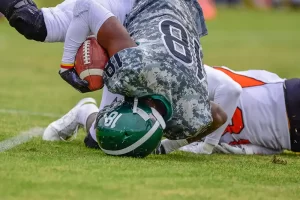Athletes and Concussions: Understanding the Risks and Consequences
Concussions are a serious concern in the world of sports, particularly for athletes participating in contact sports such as football, soccer, hockey, and boxing. A concussion is a mild traumatic brain injury (TBI) that occurs when a forceful impact or violent shaking of the head disrupts normal brain function. While often dismissed as minor injuries, concussions can have significant short- and long-term effects on an athlete’s health and performance.
The Prevalence of Concussions in Sports

Each year, an estimated 300,000 sports-related concussions occur in the United States alone. Athletes in high-contact sports face an even greater risk, with studies suggesting that up to 19% of players may experience a concussion during a single season. Repeated concussions can lead to cumulative brain damage, increasing the likelihood of long-term cognitive and neurological impairments.Symptoms and Diagnosis
Symptoms and Diagnosis
Concussions manifest in a variety of ways, including headaches, dizziness, confusion, nausea, and sensitivity to light or noise. In some cases, athletes may experience memory loss or difficulty concentrating. Contrary to common belief, loss of consciousness is not required for a concussion diagnosis. Research from the University of Pittsburgh Medical Center (UPMC) found that on-the-field amnesia is a stronger predictor of post-injury symptom severity than loss of consciousness.
The Impact on Athletes’ Health
While most concussions resolve within a few weeks, some athletes experience prolonged symptoms, a condition known as post-concussion syndrome (PCS). Additionally, multiple concussions over time can lead to chronic traumatic encephalopathy (CTE), a degenerative brain condition associated with cognitive decline, mood disorders, and behavioral changes. Many former professional athletes, particularly in football and boxing, have been diagnosed with CTE, highlighting the dangers of repeated head trauma.
Prevention and Safety Measures
Efforts to reduce concussion rates in sports have led to improved protective gear, stricter regulations, and enhanced concussion protocols. Many sports organizations now require baseline cognitive testing, sideline evaluations, and return-to-play guidelines to ensure athletes recover fully before resuming competition. Education on proper tackling techniques, rule enforcement, and awareness campaigns have also played a crucial role in minimizing risks.
Conclusion
Concussions are a significant issue for athletes, affecting both their short-term performance and long-term well-being. As research continues to shed light on the dangers of head injuries, it is crucial for athletes, coaches, and medical professionals to prioritize safety, early diagnosis, and proper recovery protocols. By taking proactive steps to prevent and manage concussions, the sports community can help protect athletes from the lasting consequences of these injuries.
We invite you to browse our website to learn why dentists and coaches recommend Kid's Comfort PRO sports mouthguard.




